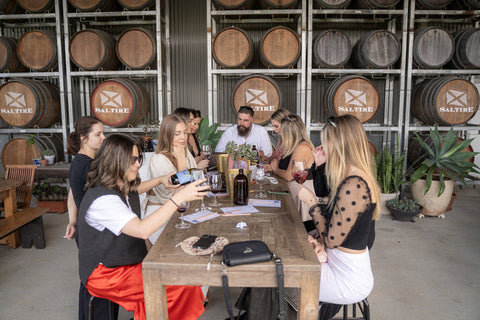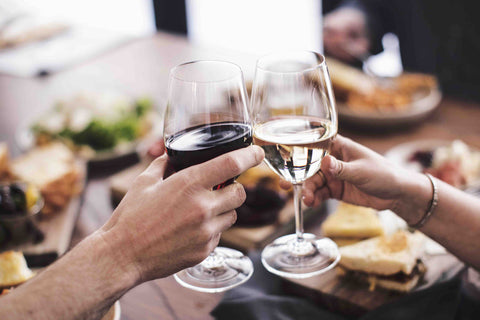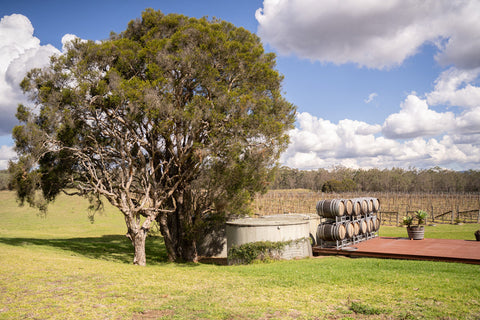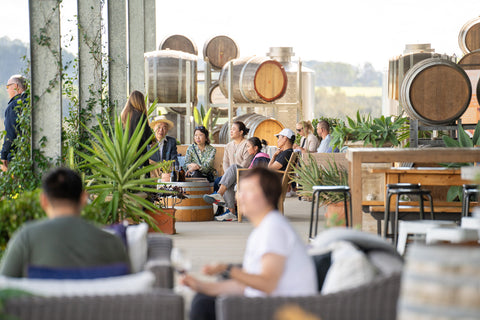Wine tastings are a fantastic way to explore different wines and learn more about what suits your taste. At Saltire Estate, we believe that a great wine-tasting experience doesn’t just happen; it’s made with thoughtful preparation and a keen sense of discovery.
Whether you're new to wine or an experienced connoisseur, there are always new tips and tricks to enhance your experience.
Preparing for a wine tasting involves more than just showing up. It’s about setting the stage for your taste buds to fully appreciate the wide range of flavours and aromas you’ll encounter. Simple actions like drinking plenty of water and avoiding strong foods beforehand can make a big difference in how you perceive each wine.

During the tasting, you’ll go through a series of steps designed to help you get the most out of each sip. This process not only highlights the different characteristics of each wine but also allows you to compare and contrast the nuances. By the end of the tasting, you'll have a richer understanding of your own preferences and what makes certain wines stand out.
Having some insights into what to look for when tasting wine can make the experience more enjoyable and educational. Knowing how to identify key tasting notes and understanding the terminology used in wine descriptions will give you a solid foundation. Whether you're visiting a winery for the first time or the hundredth, these tips will help you make the most of every drop.
Preparing for Your Wine Tasting
Getting ready for a wine tasting isn't complicated, but a bit of preparation can make a huge difference. Here are some tips to help you get the most out of your tasting experience.
- Stay Hydrated: Drink plenty of water before and during the tasting. Staying hydrated helps cleanse your palate and prevents dehydration, which can affect your sense of taste.
- Avoid Strong Flavours: Try to avoid eating spicy or strongly flavoured foods just before the tasting. These can linger in your mouth and interfere with the subtle flavours of the wines.
- Dress Comfortably: Wear comfortable clothing and shoes, especially if you're touring vineyards. You'll enjoy the experience more if you feel at ease.
- Plan Your Visit: Know ahead of time which wines you want to try. This will help you focus on the wines that interest you most and make the most of your visit.
- Bring a Notebook: Taking notes on each wine can help you remember which ones you liked best and why. Jot down your thoughts on the flavours, aromas, and what you enjoyed about each wine.
Being well-prepared sets you up for a great tasting experience. You'll be able to focus on the wines and enjoy each one to its fullest.
The Wine Tasting Process: A Step-by-Step Guide
Wine tasting involves more than just sipping and swallowing. There’s a process to help you get the most from each wine. Here’s a step-by-step guide to follow during your tasting.
- Look: Start by observing the wine in your glass. Notice the colour and clarity. Hold the glass up to the light or a white background. The colour can tell you a lot about the wine's age and grape variety.
- Swirl: Gently swirl the wine in your glass to release its aromas. This helps to oxygenate the wine, which brings out its bouquet.
- Smell: Take a moment to smell the wine. Try to identify different aromas. Can you smell fruit, flowers, spices, or other scents? Your nose plays a big part in tasting, so don’t rush this step.
- Sip: Take a small sip and let it linger in your mouth. Move the wine around to cover all your taste buds. Pay attention to the flavours and how the wine feels in your mouth. Is it smooth or tannic? Light or full-bodied?
- Reflect: After swallowing, think about the wine’s finish. How long do the flavours linger? Do you notice any aftertaste?

Following these steps helps you fully appreciate each wine’s characteristics. The more you practise, the better you'll get at identifying and enjoying the different elements of each wine.
Tasting Notes: What to Look For in a Wine
When tasting wine, understanding what to look for can help you appreciate the different elements each wine offers. Paying attention to tasting notes can enhance your experience and deepen your knowledge.
- Aromas: Start by identifying the different smells. Wines can have various aromas like fruity (berries, citrus), floral (rose, lavender), or earthy (leather, tobacco). Take your time and enjoy the bouquet.
- Flavours: Once you sip the wine, focus on the flavours. Can you taste fruits, spices, or even hints of chocolate? Every wine will have its flavour profile, which can be quite complex.
- Body: The body of the wine is how it feels in your mouth. Is it light, medium, or full-bodied? This can tell you a lot about the type of wine and its alcohol content.
- Acidity: Notice the acidity. Wines with high acidity feel crisp and refreshing, while low-acidity wines taste softer and rounder.
- Tannins: Check for tannins, which give a wine its astringency. High-tannin wines feel more drying, usually found in reds.
- Finish: Finally, think about the finish or aftertaste. How long do the flavours last after you swallow? A long finish is often a sign of high-quality wine.
Understanding these notes helps you articulate what you like or dislike about a wine. It also makes your wine-tasting experience more engaging and educational.
Making the Most of Your Wine Tasting Experience
To truly enjoy a wine tasting, it's important to immerse yourself fully in the experience. Here are some tips to make your visit memorable and worthwhile.
- Ask Questions: Don’t hesitate to ask questions about the wines, the winemaking process, and the vineyard. The staff is usually very knowledgeable and happy to share their insights.
- Take Your Time: Savour each wine slowly. Allow yourself to fully experience the aromas, flavours, and textures. Rushing through the tasting will make you miss out on the finer details.
- Stay Open-Minded: Be willing to try wines you wouldn’t normally choose. Wine tastings are about exploration and discovery. You might be surprised by what you enjoy.
- Use the Spittoon: If you intend to taste many wines, use the spittoon provided. This prevents you from getting too tipsy and helps you stay focused on the flavour profiles.
- Socialise: Engage with other visitors. Sharing experiences and preferences can offer new perspectives and make the event more enjoyable.

By following these tips, you’ll enrich your wine-tasting experience and gain a deeper appreciation for the art of winemaking. Each visit becomes not just a tasting but an adventure in flavour and aroma.
Wine Tasting Tips and Tricks
Wine tasting is an enjoyable and educational activity that allows you to explore new flavours, learn about the winemaking process, and develop your palate. By preparing adequately, following a structured tasting process, and understanding key tasting notes, you can enhance your experience significantly. Each step in the tasting journey offers something unique, making it a fun and enriching activity.
Whether you are a novice or a seasoned wine enthusiast, there’s always something new to discover. Make sure to immerse yourself fully in the experience, ask questions, and take notes. This way, you can make the most out of every wine tasting in Hunter Valley and truly enjoy what each wine has to offer.
Ready to discover the rich flavours of our unique wines? Visit Saltire Estate in the Hunter Valley for an unforgettable wine-tasting experience. Explore our selection, learn from our knowledgeable staff, and enjoy the beautiful setting that reflects our Scottish heritage. Book your visit today and let us guide you through the wonderful world of wine.




